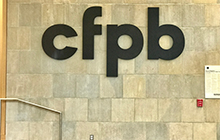 On March 19, 2021, the Consumer Financial Protection Bureau (CFPB) released its annual report to Congress regarding its administration of the Fair Debt Collection Practices Act (FDCPA). The CFPB and the Federal Trade Commission (FTC) share government enforcement responsibility for the FDCPA, and work together to coordinate their respective efforts relating to debt collection. The report covers the activities of the CFPB and the FTC relating to debt collection. Below is a summary of the report.
On March 19, 2021, the Consumer Financial Protection Bureau (CFPB) released its annual report to Congress regarding its administration of the Fair Debt Collection Practices Act (FDCPA). The CFPB and the Federal Trade Commission (FTC) share government enforcement responsibility for the FDCPA, and work together to coordinate their respective efforts relating to debt collection. The report covers the activities of the CFPB and the FTC relating to debt collection. Below is a summary of the report.
The report notes that, in 2020, the CFPB received approximately 82,700 complaints related to debt collection, an increase of approximately 10 percent compared to debt collection complaints received in 2019. The CFPB sent approximately 66 percent of these complaints to companies for their review and response, and referred approximately 26 percent of such complaints to other regulatory agencies.
The report highlights the CFPB’s examination of the following FDCPA violations:
- One or more debt collectors falsely threatened consumers with lawsuits that the collectors could not legally file or did not intend to file, in violation of Section 807(5) of the FDCPA, which prohibits “[t]he threat to take any action that cannot legally be taken or that is not intended to be taken.”
- One or more debt collectors made false representations regarding the litigation process and a consumer’s obligations in the event of litigation, in violation of Section 807(10) of the FDCPA, which prohibits “[t]he use of any false representation or deceptive means to collect or attempt to collect any debt.”
- One or more debt collectors made implied representations to consumers that they would report their debts to credit reporting companies (CRCs) if the debts remained unpaid by a certain date, but did not actually report such debts to CRCs for the relevant clients. The CFPB found that this conduct violated Section 807(10) of the FDCPA, which prohibits “[t]he use of any false representation or deceptive means to collect or attempt to collect any debt.”
- One or more debt collectors falsely represented or implied to consumers that they operated or were employed by CRCs, in violation of Section 807(16) of the FDCPA, which prohibits “[t]he false representation or implication that a debt collector operates or is employed by a consumer reporting agency.”
Additionally, the CFPB filed two amicus curiae briefs asserting that debt collectors do not violate the FDCPA when they truthfully disclose that interest will not be added to a debt while the collector services the debt. One brief was filed in a Seventh Circuit case, and the other was filed in a Third Circuit case. The CFPB also highlighted two amicus briefs filed in 2019, as the positions advanced by the CFPB prevailed in both cases: The Fourth Circuit agreed with the CFPB’s position that the FDCPA’s one-year statute of limitations does not bar consumers from challenging violations that occurred in the prior year, and the Seventh Circuit agreed with the CFPB’s position that there is no “benign language” exception to the provision of the FDCPA that prohibits debt collectors from including extraneous language or symbols on debt collection envelopes.
The CFPB engaged in four public enforcement actions arising from alleged FDCPA violations in 2020. Two of those cases continue to be litigated, and the other two were resolved with judgments ordering nearly $15.2 million in consumer redress and $80,000 in civil money penalties. The FTC brought or resolved seven debt collection cases in 2020, including three new actions under “Operation Corrupt Collector”, a nationwide debt collection sweep by the FTC, three federal agencies, and partners from 16 states.
The CFPB continued its research projects, market monitoring efforts, and outreach activities related to the debt collection market and its impact on consumers and credit markets. For example, the CFPB released guidance encouraging financial institutions to work constructively with borrowers and other customers affected by the COVID-19 pandemic. The CFPB also developed an online education tool called “Ask CFPB” to aid consumers in making better informed financial decisions.
The CFPB also issued two final rules governing the activities of debt collectors in 2020. The first final rule, which was issued on October 30, 2020, focused on debt collection communications. The second final rule, which was issued on December 18, 2020, focused on debt collection disclosures.
The efforts taken by the CFPB and the FTC during 2020 reflect heightened attention to protecting consumers, particularly individuals who have suffered profound financial hardship during the pandemic.
